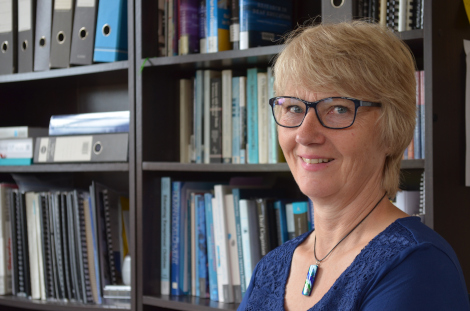Class communicators
EdD in Teacher Education
Griffith Doctor of Education (EdD) alumnus Dr Denise Powell wants to revolutionise deaf or hard of hearing (DHH) education in New Zealand and is embarking on a global study tour to investigate whether co-enrolment learning hubs are the future of education in the sector.
A $10,000 Winston Churchill Fellowship Award will fund the research trip, allowing Dr Powell to visit co-enrolment and bilingual schools for DHH and hearing students overseas.
Dr Powell received the fellowship to research education practices and techniques used at specialist DHH schools in the United States, Australia and Canada.
Dr Powell has dedicated her career to creating inclusive learning environments for DHH students in New Zealand’s mainstream education system and has been advocating for innovation in the sector.
“I’m interested in looking at how we can do a better job for kids that don’t get the best deal from mainstream education,” she said.
“95% of DHH students in New Zealand are in mainstream education and can experience a sense of isolation as the only deaf person in a classroom.”
With more than 30 years’ experience as a DHH educator, Dr Powell has seen the complexities confronting DHH students in a typical school system or tertiary environment.
Schools adopting a co-enrolment and bilingual classroom model create an immersive learning experience for DHH and hearing students.
A typical co-enrolment model in a country with English as a first language, involves students learning English and sign language under the direction of two teachers, including one specialising in deaf education.
“A benefit of this model is there are more DHH students in a class and all students are learning sign language to communicate,” she said.
“This model has shown positive outcomes for students and creates a more inclusive learning environment.”
Dr Powell’s research trip follows a similar line of inquiry to her Griffith Doctor of Education (EdD) in 2005, which investigated how New Zealand DHH tertiary students were ‘floating’ in mainstream education.
“My feeling was we were doing okay at learning support, I was more interested in the experiences around learning and social participation,” she said.
Dr Powell said while she was already working in the DHH education sector, her higher degree research created more career opportunities.
“It is a fabulous thing to do and has taken me where I wanted to go, opening doors I didn’t expect,” she said.
“At Griffith, I had access to a multitude of research specialists allowing me to develop my understanding of quantitative analysis, research techniques and writing.
“I was also able to tease out and explore ideas with leading figures in the sector and had fantastic supervisors.
“It’s really important to choose your supervisors carefully and to do something you’re passionate about because if it is something you have a passion for it will keep you going.”
After completing her EdD, Dr Powell joined the University of Canterbury where she trains teachers to become specialists in deaf education. She is also the lead teacher at a sign language immersion learning hub in Dunedin.
The goal of her research fellowship is to investigate different approaches to co-education and bilingual schools and use her knowledge to improve DHH student learning in New Zealand.
“I applied for this fellowship to see if the co-enrolment model is possible and will work,” she said.
“Co-enrolment is very topical now, but the final proof will be to see it in action.”
Dr Powell’s Griffith EdD thesis
Floating in the Mainstream: New Zealand Deaf Students’ Learning and Social Participation Experiences in Tertiary Education
Share your story
Have a remarkable story to tell? We’d love to hear about your brilliant career.
